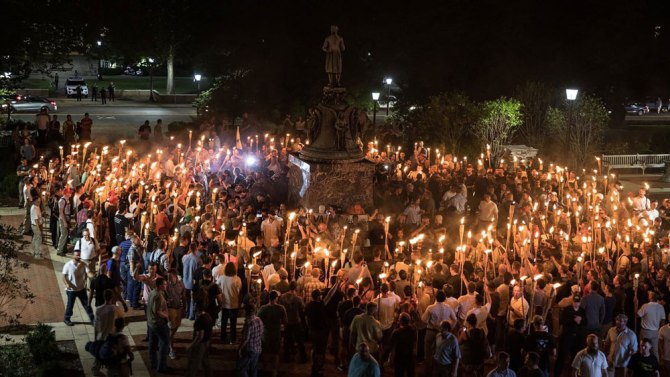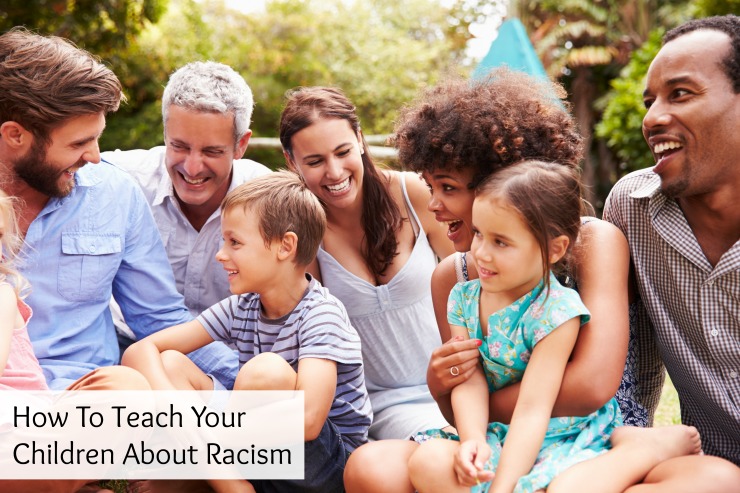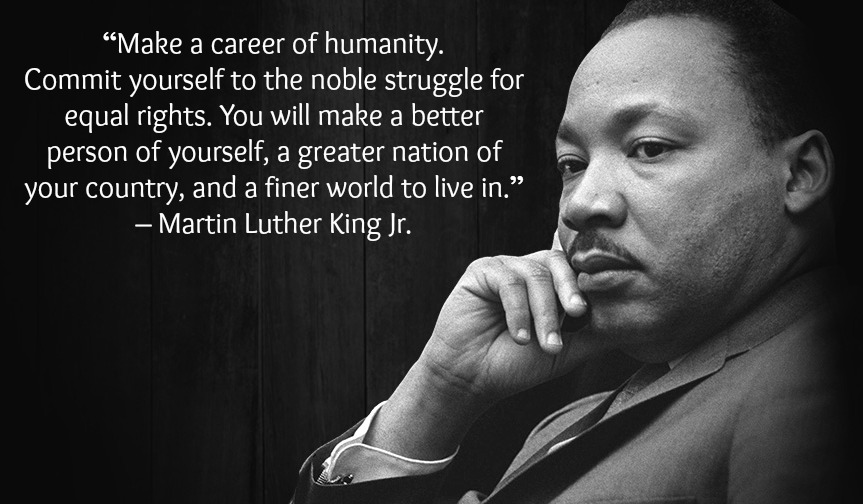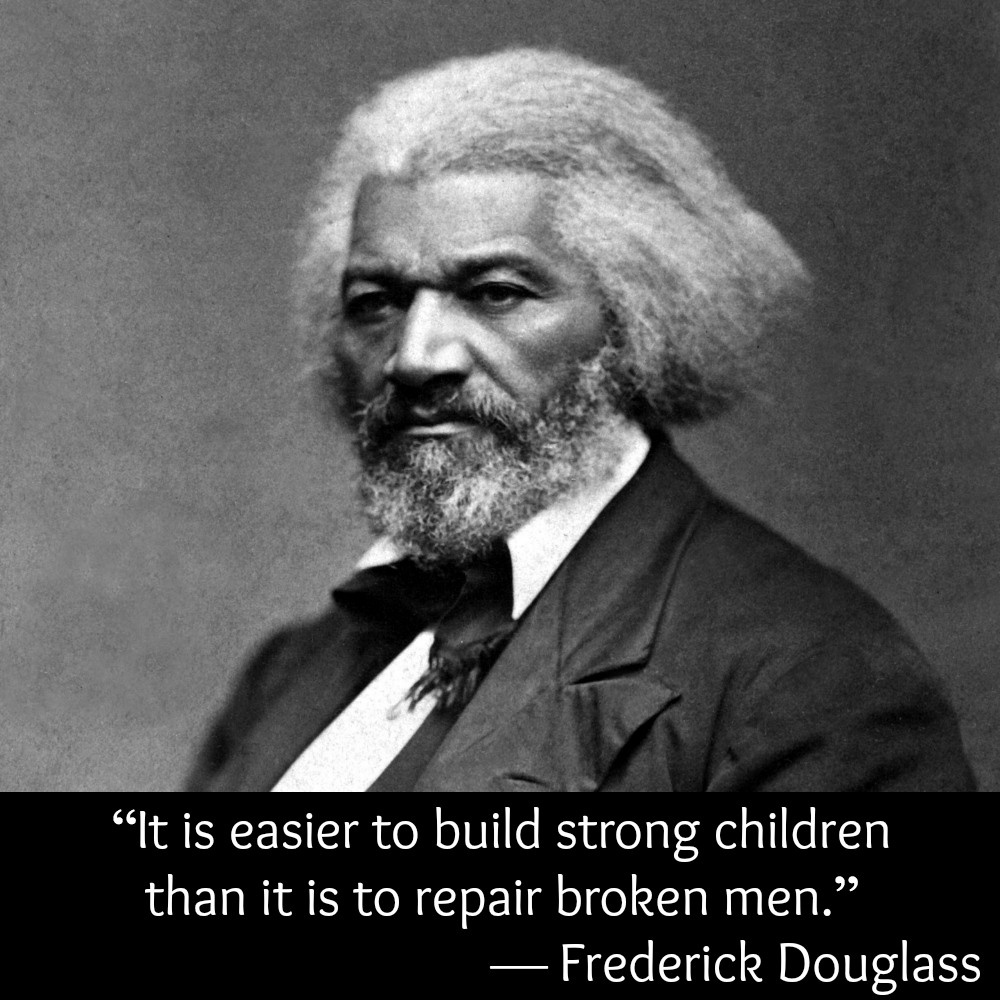Charlottesville And How To Teach Your Children About Racism Now
August 17, 2017
- 258
- 259shares
After the events in Charlottesville this weekend, I have deeply mourned the brokenness, division, and hatred we’ve seen so vividly displayed. While I can’t even begin to address all the deep pain and suffering, I can decry white supremacy, white nationalism, antisemitism and any form of evilness that fuels these bigoted philosophies. And I can urge you to teach your children about racism now.
The past several days, I have felt a collective shock, an unanimous voice begging the question, “How can this be our America?” Can this be the country I hold so dearly? The country that fought not one war, but two, to defeat the supremacy-founded evils of slavery and antisemitism? It is shattering to see the reemergence of this vitriolic hatred in such a public light in my lifetime. I’ve spent my nursing career caring for both ends of the spectrum; mainly children as a pediatric nurse practitioner, but also veterans who fought the unspeakable evil of Nazism. I can’t help but wonder what those heroes I love dearly must think of the atrocity of Charlottesville? There are no excuses.

In dealing with this pain, we must also filter through the loudness of so many jarring voices and opinions. if you are like me, you’ve stayed up far too late glued to the news, reading the analysis of our president’s statements, the history of confederate monuments and different editorials on what the hell we are supposed to do with them, as well as what free speech is protected under the first amendment and what is not. You watched the Vice piece showcasing the sickening evil of white supremacy and you felt nauseous and brokenhearted for our African American and Jewish neighbors, for all of our neighbors who are people of color. You cried when you watched the visceral racial pain shown by brave African American panelists on news shows. You are mentally trying to wrap your mind around how this is happening in 2017, and it simply can’t be done. This is where I am at today.
And if you are a parent, you may feel confused, too. You don’t feel confused about the evil of racism, but many of the parents I work with are asking themselves how do I possibly explain the events of Charlottesville to my children? How do I teach my children about race in a way they are developmentally prepared for it? Many parents are genuinely caught between the innate desire of wanting to protect their children from the violence, evil and hatred seen all over our television screens while simultaneously wondering how to prepare children to boldly stand up against the same racism, hatred, and evil.
I stress to you, teaching your children about racism is pivotally important.
When Should You Talk To Your Children About Race?
Studies have shown that children can learn racially-biased behaviors as young as three, and even infants as young as six months can learn to non-verbally categorize people by race. That means, if you haven’t started teaching your children about race already, you need to start today. Charlottesville has created a moment we can’t miss. We must rise up and teach our children.
These are hard, emotional, important days. Parenting through these times takes a hell of a lot of bravery. But you are brave. I am brave. Brené Brown did an inspiring Facebook Live video on Charlottesville yesterday on privilege, power, and perspective taking. On talking about race, one of things she said really stood out to me as a writer,
“I am completely imperfect at it. And let me tell you, if you talk about it, you are inviting a shit storm. Because you will not do it perfectly. Some people will use your imperfection in trying to have real conversations as a weapon. That’s okay, because to opt out of the conversation just because you can’t do it perfectly is the definition of privilege.” – Brené Brown
Before we dive into the important truths you need to teach your children about race, let’s look at some of the barriers and old thinking you may need to overcome.
The Fear Of Talking About Racism Imperfectly
Honestly, I am scared to talk about this, especially in a public forum. I acknowledge I will not come close to doing it perfectly. You will probably do it imperfectly, too. We need to be okay with this imperfection. We need to push past our under-qualifications as we do our best to explain racism and what happened in Charlottesville to our children. We must get the conversation started with the little minds looking up to us. It is FAR better that parents across the nation imperfectly address and educate their children on this issue than blindly avoiding it altogether out of fear.
What About Waiting For The Race Talk?
Many parents overly glorify the concept of sitting pre-teens down and explaining them the must-know truths of this world in overly-long, one-time conversations. But life doesn’t work that way. Your children are having these conversations with or without you, and wouldn’t you rather they begin having them with you first?
The choice to wait to address racism with your children until you feel like they are grown up and can handle it is a privilege that not all families share. It’s also a fallacy. Children need to be taught small, foundational, developmental truths about race with honesty their ENTIRE life. From infancy onward. You cannot begin these conversations too early.
Racism And Humanity
Finally, the topic of race is so interwoven fundamentally to our humanity and creation I have no way of separating my Christian ideology from how we explain this to our children. It is impossible for me to teach the concept of valuing all human life without teaching children how God values and loves all people. The truths we are about to dive into are a combination of what I know about childhood developmental, shaped by a paradigm of having a life-changing relationship with an ever-loving God.

Important Truths To Teach Your Children About Racism
I am committed that my children’s generation will do better and be better than the racist depravity we saw at Charlottesville. I am committed to them living lives spreading kindness and equality for all people. These are the principles I commit to teaching my future children.
1. Teach your children that ALL people are created in the image of God (All children of all ages)
This is home base. Teach your children they are fearfully and wonderfully made (Psalms 139:14), no matter their skin tone. Teach them that because of this, all men and women are created equal in the eyes of God. It’s never too early to teach this. Children can hear their parents voice before they are even born, as early as 16 weeks gestation. Speak this truth over their lives before they can even speak to you. God makes no mistakes. Not only were we created in the very image of God, He said His creation of people was good (Genesis 1:31). God is good, and He does good (Psalms 119:68).
2. Teach your children to love their neighbor as themselves (All children of all ages)
Jesus didn’t tell us to love our neighbor as ourselves because it was easy. He gave us the second greatest commandment of all time (Mark 12:31) because even then, people weren’t doing it, and they needed to do better. Friends, we have to seriously UP OUR GAME. We, alongside our children, must love all neighbors of all skin tones. Kindness and neighborly love training starts in infancy.
3. Teach your children that differences actually make us stronger (All children of all ages)
Teach your children that diversity is beautiful. If everyone in your circle looks like you, you and your children need a bigger, more beautiful circle immediately. This goes for play dates, schools, churches, grocery stores, everything.
I’ve read comments from parents this week that they are teaching their children “not to see color.” This is a very dangerous fallacy. Children are not colorblind. Of course children see differences in skin tone and races. Children from an incredibly young age are naturally curious about the differences they see. We specifically read toddlers and young children books and play games that train them to look for differences! “How is this picture different from that picture?” Anyone with a young child gets questions like, “Why is mommy different than daddy? Why is my sister different from me? Why do I look the way I do? Why does he have dark hair and I have light hair? Why is his skin darker than mine?” Research has shown that even babies discriminate. Childhood curiosity about our differences is natural, beautiful and should be developmentally encouraged.
So how do we address these questions head on? In addition to point 1 and 2 above, we teach our children biology and anatomy. Again, from as young an age as possible. There are so many different resources available to parents. When it comes to different skin tones, teach your children about pigment and melanin. This animated video is excellent for younger children and this video, How We Get Our Color, explains melanin and is helpful for older children (approximately 9-10 years old and up). We do not shy away from differences when we fully understand that racial differences make us stronger.Read books for children about race and racism, as well as books that celebrate diversity. Don’t teach your children to be shy about differences, teach them that differences are beautiful and created by God Himself.
4. Don’t overlook fostering equality in your own home (All families with children of all ages)
Denounce favoritism and inequality in all forms. It’s estimated that 1/3 to 2/3 of American families have a form of parental favoritism, aka, when a parent favors one child over another. Ouch. We know this is a known cause of sibling rivalry and deep psychological wounds. We can’t expect our children to form a health view on societal and racial equality if we are fostering inequality like (but not limited to) favoritism in our own homes. It’s important to self-reflect on this and make sure we are practicing what we preach to our kids.
5. Teach your children history (5 years and older)
Teach your children that entire wars were fought to defeat racism, slavery, and Nazism. Find a World War II veteran in your community and take your children to meet and honor him or her. Teach them about the Civil Rights Movement. Read Uncle Jed’s Barbershop to your young children and remind them of a time in history less than 100 years ago.
Make racial history in America as real and vivid as possible. Post quotes like this one from Martin Luther King Jr. in your home and teach your children what an amazing man he was:

6. Teach your children that slavery is diabolically evil and wrong (All children of all ages)
These conversations will grow as your children grow. Uncle Tom’s Cabin should be mandatory reading in high schools across America. Our children need to know why so many Union soldiers gave their lives during the Civil War with a copy of this book in their pocket. Harriet Beecher Stowe detailed the horror of slavery in the South and legend has it that even President Lincoln himself told her, “So you’re the little woman who wrote the book that started this great war.”
We can’t shelter our pre-teens and teens from the horrifying details of slavery in America. They simply have to know.
7. Teach your children about the First Amendment (5 years and older)
Our democracy was founded on the First Amendment; it’s the glory of America. Being able to vocalize and express opinions is a precious right, but as you teach your children about their rights, be sure to teach them that the freedom to express opinions does not make them innately right. Citizens have the responsibility to rise up and denounce evil when it is spread.
8. Teach your children to always advocate for those who are marginalized or weaker than they are (All children of all ages)
Be honest with your children. Explain to them that even if they haven’t seen overt racism or marginalization up close in their world, there will come a day when this will happen, and how they react will reveal their character. Teach them that God is near to the brokenhearted (Psalms 34:18) and we must be as well. Talk about how they can be an ally for those who are marginalized. Role play scenarios where they stand up for a friend, or even a stranger.
9. Teach your children to cherish peace and love justice (All children of all ages)
Cultivate a spirit in your children that loves and longs for peace. Blessed are the peacemakers for they will be called children of God (Matthew 5:9). We work towards peace in our homes, we work for peace in our community, and we work for peace in our nation and world for the sake of all the citizens of it. Teach children that peace and justice are siblings.
“True peace is not merely the absence of tension; it is the presence of justice.” – Martin Luther King Jr.
While I understand the desire to shelter children from violence and hate, we must not make the more dangerous mistake of not teaching our children from the earliest of stages the danger and devastation of racism. A topic so complex and painful can be broken down into developmentally appropriate way so children know the truth. They need to hear this from you, their parents.
One doesn’t have to observe a toddler long to learn that kindness isn’t natural. Kindness and love are taught. We must be intentional about this teaching every day.
Most important in teaching your children about racism is to keep communicating these truths over and over again, and putting them in context of the things that your children are seeing in the world every day. This means talking about big news stories like Charlottesville and also talking about small stories like what was said at the lunchroom table.

Even at an early age your children can and must be empowered to speak out against hate and speak up for love and the rights of all children, men, and women to live in equality. As the great abolitionist Frederick Douglass said, “It is easier to build strong children than it is to repair broken men.”
Author: Dani Stringer, MSN, CPNP, PMHS – founder of KidNurse and MomNurse Academy
- 258
- 259shares